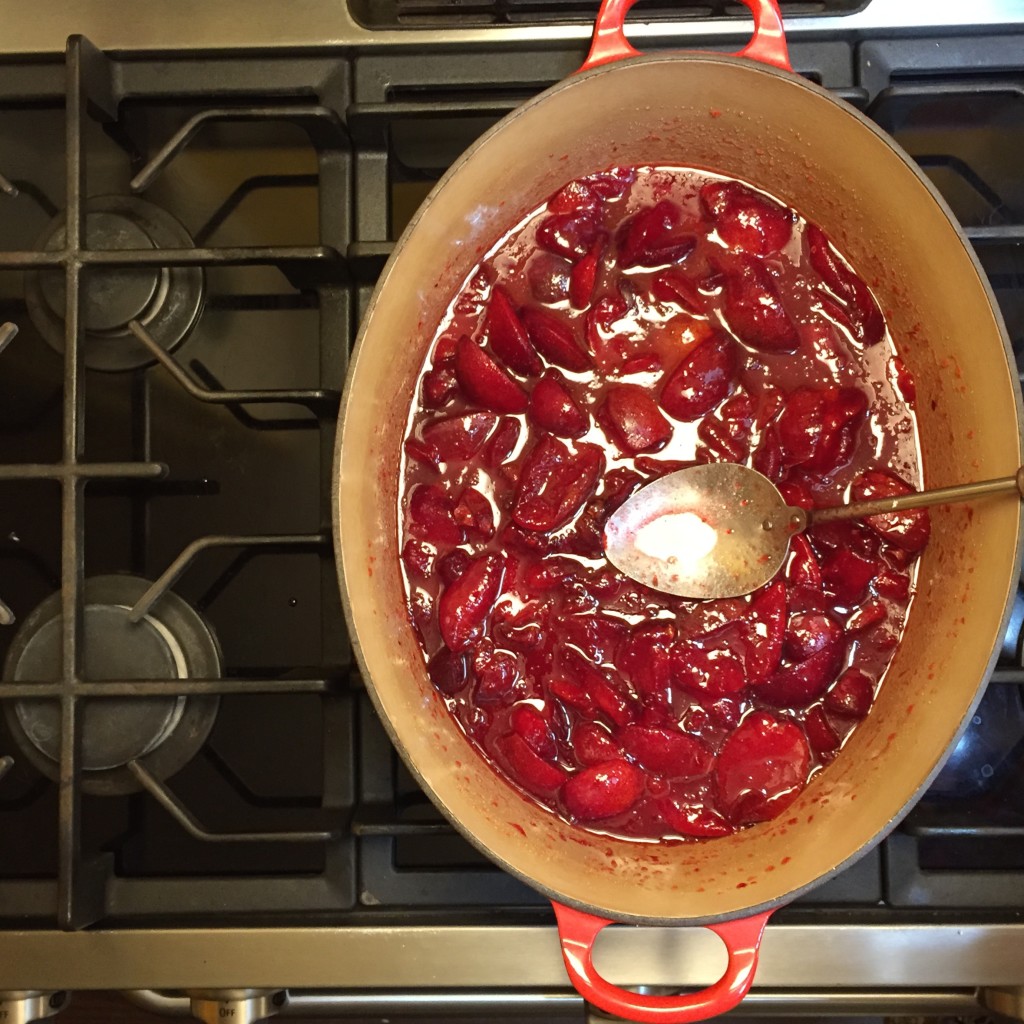preserved
If you stop by the farm, most likely you will find us at the stove stirring big vats of plums or apples for jam and sauce. Our fruit trees are laden this year, and like all good homesteaders, we cannot let this bounty go to waste.

Both my grandmother and mother preserved food both by canning and freezing. Eating the summer crops in the deep mid-winter was not only a pleasure but a necessity. When we moved from the suburbs to the tiny town of Delaplane in 1972, the back to the land movement was well under way. Ironically, as an adult, I never thought to ask my Dad if he was a follower of the Nearings or a reader of the Whole Earth Catalog. He did want us to learn how to work and to know the effort of labor related to the land.
Before we actually took possession of the house that June, he negotiated with the owner for us to re-claim the garden during the spring months. On Saturdays, as my suburb friends played, we loaded up the station wagon with tools and lunch and drove the hour and a half drive from Alexandria out to the farm nestled in the shadow of the Blue Ridge Mountains. Eventually, seeds were planted and by the time we moved there in June, the garden was well underway.
During the summer months, we learned new chores—watering, weeding and finally harvesting. If I thought weeding was tedious in the hot southern sun, I certainly was not prepared for the hours spent picking produce and preparing it for canning jars. Standing over the work sink in the windowless basement seemed interminable. Then and there I swore never to have a garden. Ironically, one of the first items on our to-do list when we moved here was to establish a garden. Walking to the garden to gather sun-ripened tomatoes along with fistfuls of basil is one of life’s true pleasures. Preserving these crops is the next logical step; if not, we would squander the delicious food and waste the human effort put into growing them.
On the colonial farm, food preservation meant survival. Andrea Jones, Director of Programs and Visitor Experience at Accokeek Foundation, states that Americans living in the colonial era wouldn’t have wasted their food. “The Boltons would have valued every morsel of food, because it’s survival,” said Jones, who has seen food waste in this country increase by 50 percent in her lifetime. “I think a lot of people don’t realize how recent a problem it is.” ’
The Boltons, as historical interpreters, live on The Colonial Farm situated on the banks of the Potomac River on the grounds of the Accokeek Foundation. Visiting the Farm and Foundation is a perfect example of looking back to look forward, for one experiences the hardscrabble life of the farm family as well as the forward thinking of their Ecosystem Farm. This Saturday is a great day to visit The Colonial Farm and attend the Food for Thought Festival from noon to 5pm. The afternoon is filled with panels, demonstrations and information. Here is the link: http://accokeekfoundation.org/event/food-for-thought/
Andrea Jones comments from the article by Whitney Pipkin, “How will you make it through the winter?,” Bay Journal. Accessed on 9/22/15, http://www.bayjournal.com/article/how_will_you_make_it_through_the_winter.
I think this is my very favorite blog, Brece. It makes me feel good thinking about all the things you mention here. I felt your ‘pain’ at having to spend your Saturday’s making ready the Delaplane garden.
Overall, those days make life now easier in your own gardens. Yummm on that plum jam and applesauce.